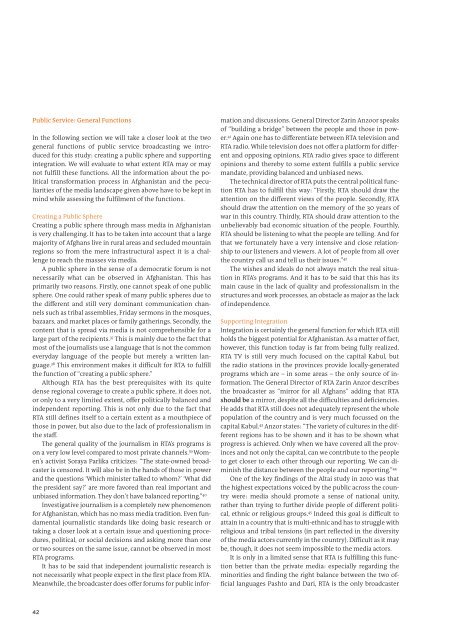edition-dw-akademie-in-the-service-of-the-public-functions-and-transformation-of-media-in-developing-countries-pdf
edition-dw-akademie-in-the-service-of-the-public-functions-and-transformation-of-media-in-developing-countries-pdf
edition-dw-akademie-in-the-service-of-the-public-functions-and-transformation-of-media-in-developing-countries-pdf
Create successful ePaper yourself
Turn your PDF publications into a flip-book with our unique Google optimized e-Paper software.
Public Service: General FunctionsIn <strong>the</strong> follow<strong>in</strong>g section we will take a closer look at <strong>the</strong> twogeneral <strong>functions</strong> <strong>of</strong> <strong>public</strong> <strong>service</strong> broadcast<strong>in</strong>g we <strong>in</strong>troducedfor this study: creat<strong>in</strong>g a <strong>public</strong> sphere <strong>and</strong> support<strong>in</strong>g<strong>in</strong>tegration. We will evaluate to what extent RTA may or maynot fulfill <strong>the</strong>se <strong>functions</strong>. All <strong>the</strong> <strong>in</strong>formation about <strong>the</strong> political<strong>transformation</strong> process <strong>in</strong> Afghanistan <strong>and</strong> <strong>the</strong> peculiarities<strong>of</strong> <strong>the</strong> <strong>media</strong> l<strong>and</strong>scape given above have to be kept <strong>in</strong>m<strong>in</strong>d while assess<strong>in</strong>g <strong>the</strong> fulfilment <strong>of</strong> <strong>the</strong> <strong>functions</strong>.Creat<strong>in</strong>g a Public SphereCreat<strong>in</strong>g a <strong>public</strong> sphere through mass <strong>media</strong> <strong>in</strong> Afghanistanis very challeng<strong>in</strong>g. It has to be taken <strong>in</strong>to account that a largemajority <strong>of</strong> Afghans live <strong>in</strong> rural areas <strong>and</strong> secluded mounta<strong>in</strong>regions so from <strong>the</strong> mere <strong>in</strong>frastructural aspect it is a challengeto reach <strong>the</strong> masses via <strong>media</strong>.A <strong>public</strong> sphere <strong>in</strong> <strong>the</strong> sense <strong>of</strong> a democratic forum is notnecessarily what can be observed <strong>in</strong> Afghanistan. This hasprimarily two reasons. Firstly, one cannot speak <strong>of</strong> one <strong>public</strong>sphere. One could ra<strong>the</strong>r speak <strong>of</strong> many <strong>public</strong> spheres due to<strong>the</strong> different <strong>and</strong> still very dom<strong>in</strong>ant communication channelssuch as tribal assemblies, Friday sermons <strong>in</strong> <strong>the</strong> mosques,bazaars, <strong>and</strong> market places or family ga<strong>the</strong>r<strong>in</strong>gs. Secondly, <strong>the</strong>content that is spread via <strong>media</strong> is not comprehensible for alarge part <strong>of</strong> <strong>the</strong> recipients. 37 This is ma<strong>in</strong>ly due to <strong>the</strong> fact thatmost <strong>of</strong> <strong>the</strong> journalists use a language that is not <strong>the</strong> commoneveryday language <strong>of</strong> <strong>the</strong> people but merely a written language.38 This environment makes it difficult for RTA to fulfill<strong>the</strong> function <strong>of</strong> “creat<strong>in</strong>g a <strong>public</strong> sphere.”Although RTA has <strong>the</strong> best prerequisites with its quitedense regional coverage to create a <strong>public</strong> sphere, it does not,or only to a very limited extent, <strong>of</strong>fer politically balanced <strong>and</strong><strong>in</strong>dependent report<strong>in</strong>g. This is not only due to <strong>the</strong> fact thatRTA still def<strong>in</strong>es itself to a certa<strong>in</strong> extent as a mouthpiece <strong>of</strong>those <strong>in</strong> power, but also due to <strong>the</strong> lack <strong>of</strong> pr<strong>of</strong>essionalism <strong>in</strong><strong>the</strong> staff.The general quality <strong>of</strong> <strong>the</strong> journalism <strong>in</strong> RTA’s programs ison a very low level compared to most private channels. 39 Women’sactivist Soraya Parlika criticizes: “The state-owned broadcasteris censored. It will also be <strong>in</strong> <strong>the</strong> h<strong>and</strong>s <strong>of</strong> those <strong>in</strong> power<strong>and</strong> <strong>the</strong> questions ‘Which m<strong>in</strong>ister talked to whom?’ ‘What did<strong>the</strong> president say?’ are more favored than real important <strong>and</strong>unbiased <strong>in</strong>formation. They don’t have balanced report<strong>in</strong>g.” 40Investigative journalism is a completely new phenomenonfor Afghanistan, which has no mass <strong>media</strong> tradition. Even fundamentaljournalistic st<strong>and</strong>ards like do<strong>in</strong>g basic research ortak<strong>in</strong>g a closer look at a certa<strong>in</strong> issue <strong>and</strong> question<strong>in</strong>g procedures,political, or social decisions <strong>and</strong> ask<strong>in</strong>g more than oneor two sources on <strong>the</strong> same issue, cannot be observed <strong>in</strong> mostRTA programs.It has to be said that <strong>in</strong>dependent journalistic research isnot necessarily what people expect <strong>in</strong> <strong>the</strong> first place from RTA.Meanwhile, <strong>the</strong> broadcaster does <strong>of</strong>fer forums for <strong>public</strong> <strong>in</strong>for-mation <strong>and</strong> discussions. General Director Zar<strong>in</strong> Anzoor speaks<strong>of</strong> “build<strong>in</strong>g a bridge” between <strong>the</strong> people <strong>and</strong> those <strong>in</strong> power.41 Aga<strong>in</strong> one has to differentiate between RTA television <strong>and</strong>RTA radio. While television does not <strong>of</strong>fer a platform for different<strong>and</strong> oppos<strong>in</strong>g op<strong>in</strong>ions, RTA radio gives space to differentop<strong>in</strong>ions <strong>and</strong> <strong>the</strong>reby to some extent fulfills a <strong>public</strong> <strong>service</strong>m<strong>and</strong>ate, provid<strong>in</strong>g balanced <strong>and</strong> unbiased news.The technical director <strong>of</strong> RTA puts <strong>the</strong> central political functionRTA has to fulfill this way: “Firstly, RTA should draw <strong>the</strong>attention on <strong>the</strong> different views <strong>of</strong> <strong>the</strong> people. Secondly, RTAshould draw <strong>the</strong> attention on <strong>the</strong> memory <strong>of</strong> <strong>the</strong> 30 years <strong>of</strong>war <strong>in</strong> this country. Thirdly, RTA should draw attention to <strong>the</strong>unbelievably bad economic situation <strong>of</strong> <strong>the</strong> people. Fourthly,RTA should be listen<strong>in</strong>g to what <strong>the</strong> people are tell<strong>in</strong>g. And forthat we fortunately have a very <strong>in</strong>tensive <strong>and</strong> close relationshipto our listeners <strong>and</strong> viewers. A lot <strong>of</strong> people from all over<strong>the</strong> country call us <strong>and</strong> tell us <strong>the</strong>ir issues.” 42The wishes <strong>and</strong> ideals do not always match <strong>the</strong> real situation<strong>in</strong> RTA’s programs. And it has to be said that this has itsma<strong>in</strong> cause <strong>in</strong> <strong>the</strong> lack <strong>of</strong> quality <strong>and</strong> pr<strong>of</strong>essionalism <strong>in</strong> <strong>the</strong>structures <strong>and</strong> work processes, an obstacle as major as <strong>the</strong> lack<strong>of</strong> <strong>in</strong>dependence.Support<strong>in</strong>g IntegrationIntegration is certa<strong>in</strong>ly <strong>the</strong> general function for which RTA stillholds <strong>the</strong> biggest potential for Afghanistan. As a matter <strong>of</strong> fact,however, this function today is far from be<strong>in</strong>g fully realized.RTA TV is still very much focused on <strong>the</strong> capital Kabul, but<strong>the</strong> radio stations <strong>in</strong> <strong>the</strong> prov<strong>in</strong>ces provide locally-generatedprograms which are – <strong>in</strong> some areas – <strong>the</strong> only source <strong>of</strong> <strong>in</strong>formation.The General Director <strong>of</strong> RTA Zar<strong>in</strong> Anzor describes<strong>the</strong> broadcaster as “mirror for all Afghans” add<strong>in</strong>g that RTAshould be a mirror, despite all <strong>the</strong> difficulties <strong>and</strong> deficiencies.He adds that RTA still does not adequately represent <strong>the</strong> wholepopulation <strong>of</strong> <strong>the</strong> country <strong>and</strong> is very much focussed on <strong>the</strong>capital Kabul. 43 Anzor states: “The variety <strong>of</strong> cultures <strong>in</strong> <strong>the</strong> differentregions has to be shown <strong>and</strong> it has to be shown whatprogress is achieved. Only when we have covered all <strong>the</strong> prov<strong>in</strong>ces<strong>and</strong> not only <strong>the</strong> capital, can we contribute to <strong>the</strong> peopleto get closer to each o<strong>the</strong>r through our report<strong>in</strong>g. We can dim<strong>in</strong>ish<strong>the</strong> distance between <strong>the</strong> people <strong>and</strong> our report<strong>in</strong>g.” 44One <strong>of</strong> <strong>the</strong> key f<strong>in</strong>d<strong>in</strong>gs <strong>of</strong> <strong>the</strong> Altai study <strong>in</strong> 2010 was that<strong>the</strong> highest expectations voiced by <strong>the</strong> <strong>public</strong> across <strong>the</strong> countrywere: <strong>media</strong> should promote a sense <strong>of</strong> national unity,ra<strong>the</strong>r than try<strong>in</strong>g to fur<strong>the</strong>r divide people <strong>of</strong> different political,ethnic or religious groups. 45 Indeed this goal is difficult toatta<strong>in</strong> <strong>in</strong> a country that is multi-ethnic <strong>and</strong> has to struggle withreligious <strong>and</strong> tribal tensions (<strong>in</strong> part reflected <strong>in</strong> <strong>the</strong> diversity<strong>of</strong> <strong>the</strong> <strong>media</strong> actors currently <strong>in</strong> <strong>the</strong> country). Difficult as it maybe, though, it does not seem impossible to <strong>the</strong> <strong>media</strong> actors.It is only <strong>in</strong> a limited sense that RTA is fulfill<strong>in</strong>g this functionbetter than <strong>the</strong> private <strong>media</strong>: especially regard<strong>in</strong>g <strong>the</strong>m<strong>in</strong>orities <strong>and</strong> f<strong>in</strong>d<strong>in</strong>g <strong>the</strong> right balance between <strong>the</strong> two <strong>of</strong>ficiallanguages Pashto <strong>and</strong> Dari, RTA is <strong>the</strong> only broadcaster42


